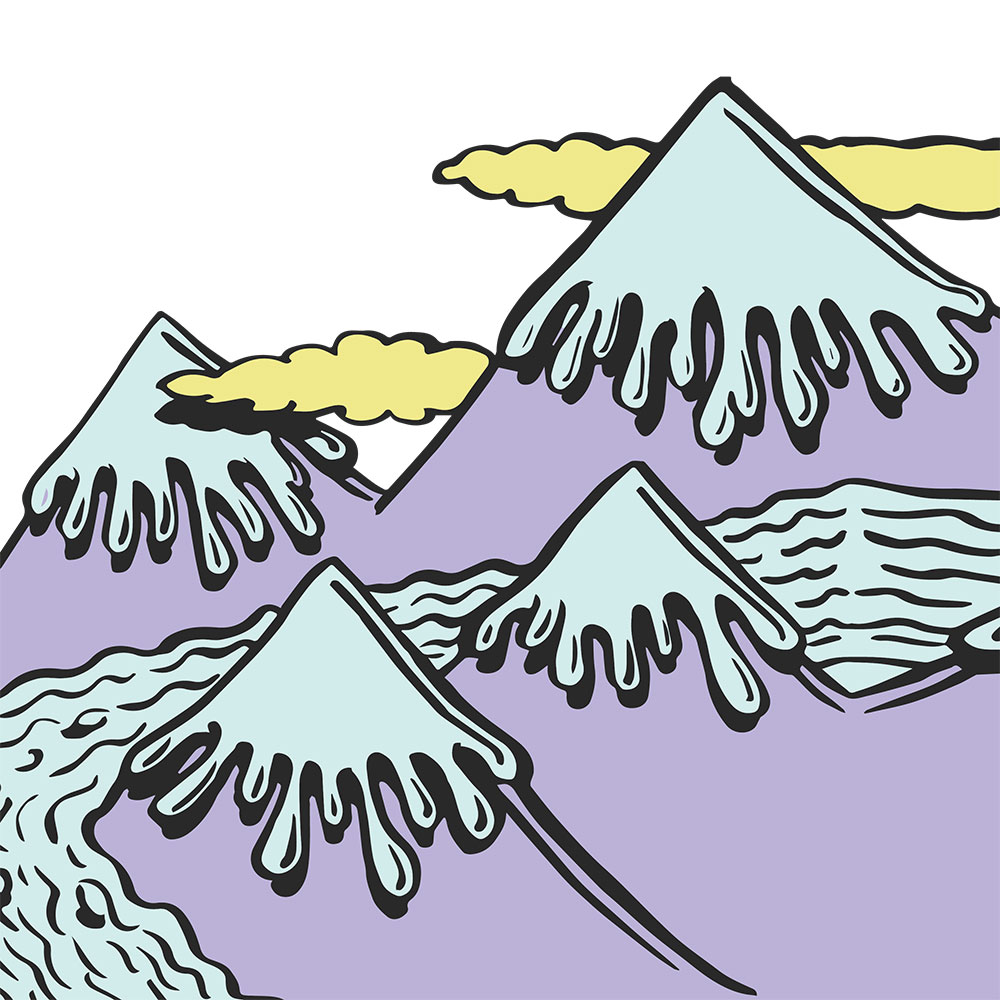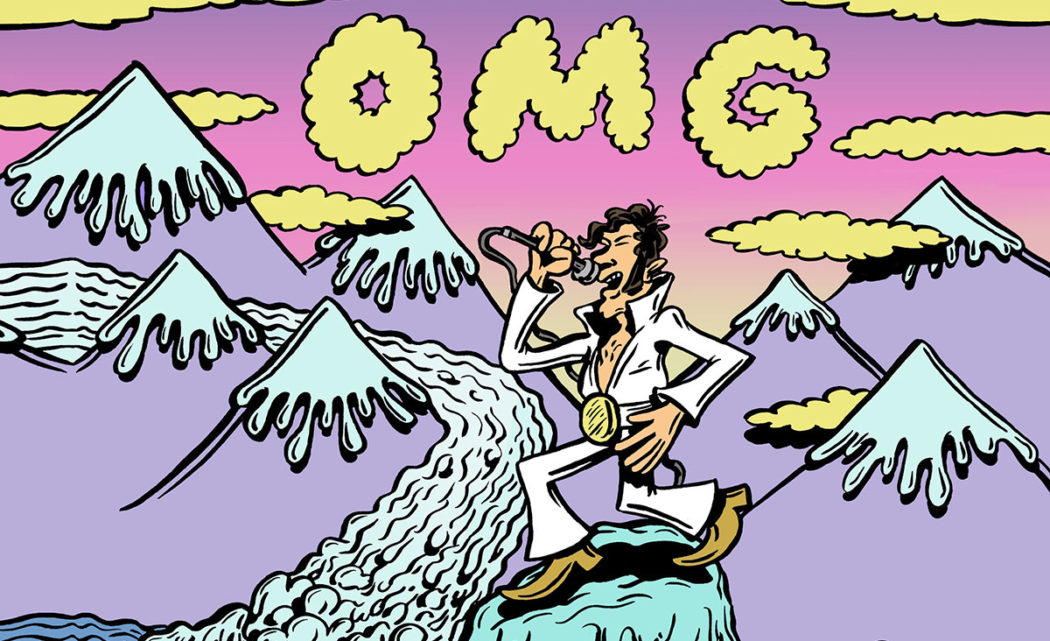A hunka hunka burning planet has got Climate Elvis all shook up
Illustrations by Matt J. Adams
The National Aeronautics and Space Administration has a thing for acronyms. Josh Willis, a climate scientist who works out of NASA’s Jet Propulsion Laboratory in Pasadena, knew this full well, of course, when he named his research project Oceans Melting Greenland. Not all of his colleagues immediately saw the humor in seeing three letters much more associated with a tween’s texts than one of the government’s more esteemed science agencies splashed across official reports, but Willis is no ordinary lab lurker. “I started out actually trying to be a physicist and I wound up an oceanographer because I failed out of physics,” Willis told Whalebone. On the way to his Ph.D. in Oceanography, besides failing out of physics, Willis studied theater and went through the Second City improv program, worked with the Groundlings, and regularly takes part in workshops in LA. His character Climate Elvis—Willis dresses in a rhinestone-studded white jumpsuit and sings songs about global warming—was born of these twin passions. Even the name of his years-long research project for NASA came out of an improv workshop.
We asked Willis, who Rush Limbaugh once called “an idiot leftist scientist” (the quote is proudly emblazoned on his business card), about Memphis, glaciers, Greenland, and how magnets work, which he very patiently answered.
I said, “I want to make global warming funny.” And he said, “Good luck.”
What is Oceans Melting Greenland?
So this is a now six-year-long experiment where we’re flying airplanes around Greenland and we’re trying to answer this very simple science question: How much are the oceans eating away at the ice there? We think of Greenland as this big ice cube that’s just melting because the air is getting hot. But in fact, actually the ice on Greenland is flowing off the land into the ocean. And when it gets there, it reaches the seawater and it sits down below the sea surface in a lot of places. Some of these places, the ice is sitting on bedrock that’s a thousand yards below the surface. If you think about that for a second, the ice is literally sitting in almost a mile of deep water. So this ice feels the ocean warming directly. And what we’re finding out through this experiment is that the ice is really reacting a lot to what the ocean is doing. So it’s not just the atmosphere warming, it’s also the ocean warming.

Have there ever been times when you’re supposed to be doing something really serious at NASA and then you see or hear your project name’s acronym and it just cracks you up?
Yeah. I mean, it’s my joke so I never get tired of hearing it, but of course that’s part of what I try and do in general, right? I mean, climate change is a pretty serious business. Hundreds of millions of people live within arm’s length of the ocean and sea-level rise is going to be one of the most expensive disasters of this hundred-year period. But at the same time, it can be so serious that it blocks people from action. You get frozen. Like, “Wow, what can I possibly do about that?” And, having a good laugh about it is a good start. Being able to kind of laugh at ourselves and at our foibles as it were, is really the first step in figuring out how to address it, how to move past it, and how to hopefully avoid the worst of the disaster.
What else can people do besides laugh to start to make a difference?
Vote. Laugh your way to the polls. Of course you should drive a Prius, plant a tree, eat less meat. But voting is really the single most important thing you can do to protect the environment. Vote for the environment and tell your elected officials that you care about it. We often think about democracy as ending on election day, but really it’s just beginning because all of your representatives are supposed to represent you. And if you don’t tell them the climate is important to you, then they don’t know. Plenty of people are talking to them and if you’re not one of them, they’re not paying attention to you.
What is the scientific consensus on climate change?
All serious scientists know the oceans are rising and they’re going to keep rising, for our lives and our children’s lives and our grandchildren’s lives. It’s really not a question of whether they’re going to rise. It’s a question of how much. And it’s not going to slow down. So the current rate would put it at a foot or two by 2100. But the rate is speeding up, too. And the question is “How much sea-level rise are we going to get in 2100?” We don’t have a good answer yet. There’s not a scientific consensus over how much. Are we going to get more sea-level rise? Absolutely. Total scientific consensus. You’d have to be crazy to think sea-level rise is going to stop. The only question is, “Are we going to get two or three feet or are we going to get six or ten feet?”
Is it saying things like this that compelled Rush Limbaugh to call you an idiot leftist scientist?
We had this paper about ocean warming, and it was a little surprising, and Rush Limbaugh said, and I quote “To overturn the world economy based on the musings of a few idiot leftist scientists is just stupid. And that’s what global warming is actually all about.”
That is quite the badge of honor.
Yeah. I thoroughly enjoyed it. My colleagues were horrified, but my comedian friends thought it was the greatest thing ever.

You work for NASA. Do you ever get to wear a spacesuit?
Well, I do wear a NASA-blue flight suit when we fly around Greenland in the airplane dropping these probes out of it.
How much time do you get to spend doing that?
We spend about a month each year in Greenland collecting data over the oceans. We also have, or we had another aircraft that flew around and measured the ice, but since OMG started, a new satellite called ISAT 2 was launched and it’s kind of doing all the hard work of looking at how the ice is changing now. And so we’re only doing the ocean survey each August and we’ll have another one this August. And then another one in 2021 and wrap it all up.
A lot of people are well engaged with what’s going on and we sure appreciate having that data you’re collecting and knowledge of how bad things will get. So can you just tell us what NASA’s secret plan is for all of us for when the planet becomes uninhabitable?
No, I can’t. I’d have to kill you if I told you that.
We had to ask.
Yeah, you got to ask. I know. Top secret. No, the truth is that anything that’s top secret, they don’t tell me either. So I’ll be right there with you and we’ll be looking for the bunker together.

